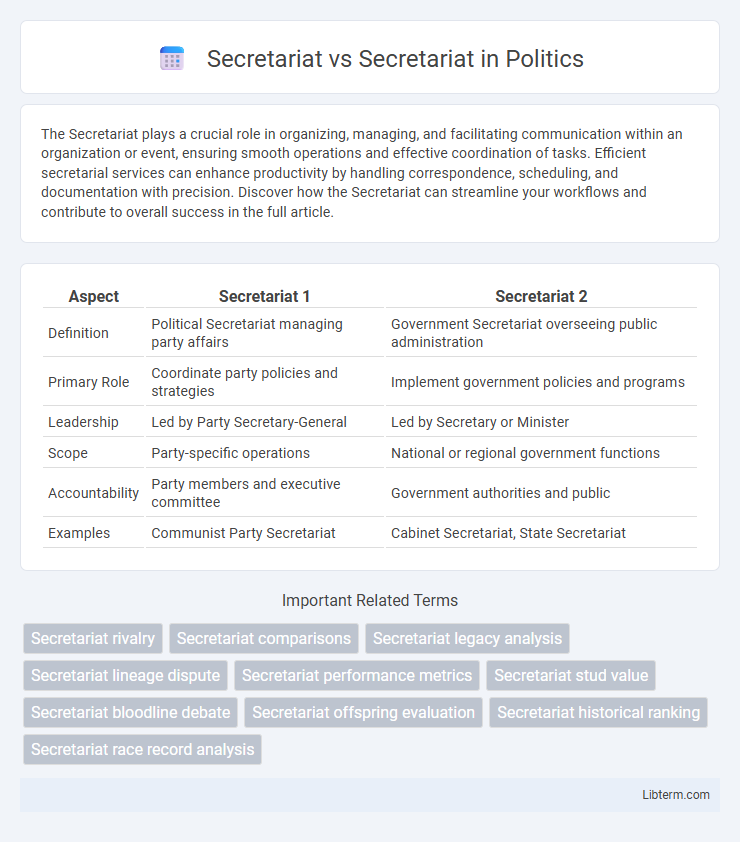The Secretariat plays a crucial role in organizing, managing, and facilitating communication within an organization or event, ensuring smooth operations and effective coordination of tasks. Efficient secretarial services can enhance productivity by handling correspondence, scheduling, and documentation with precision. Discover how the Secretariat can streamline your workflows and contribute to overall success in the full article.
Table of Comparison
| Aspect | Secretariat 1 | Secretariat 2 |
|---|---|---|
| Definition | Political Secretariat managing party affairs | Government Secretariat overseeing public administration |
| Primary Role | Coordinate party policies and strategies | Implement government policies and programs |
| Leadership | Led by Party Secretary-General | Led by Secretary or Minister |
| Scope | Party-specific operations | National or regional government functions |
| Accountability | Party members and executive committee | Government authorities and public |
| Examples | Communist Party Secretariat | Cabinet Secretariat, State Secretariat |
Introduction to the Term "Secretariat
The term "Secretariat" refers to an administrative office or department responsible for managing organizational operations and communications, commonly found within governmental, intergovernmental, or corporate structures. It embodies the pivotal role of coordinating activities, facilitating communication, and supporting decision-making processes across various levels of authority. Distinctions between different "Secretariats" often arise based on their jurisdiction, such as the United Nations Secretariat focused on international diplomacy versus a national government secretariat managing domestic affairs.
Secretariat in Government Organizations
Secretariat in government organizations functions as a pivotal administrative body responsible for coordinating activities, implementing policies, and facilitating communication among various departments. It ensures operational efficiency by managing documentation, organizing meetings, and supporting decision-making processes critical to governance. The Secretariat serves as the backbone for executing government directives, maintaining records, and providing essential logistical support to elected officials and public administrators.
Secretariat in International Bodies
Secretariat within international bodies serves as the administrative and executive branch responsible for implementing decisions, managing daily operations, and coordinating activities among member states. Key examples include the United Nations Secretariat, led by the Secretary-General, which oversees peacekeeping, humanitarian efforts, and global policy initiatives. This structure ensures efficient communication, resource management, and policy enforcement across complex multinational organizations.
Secretariat vs. Secretariat: Contextual Differences
Secretariat vs. Secretariat highlights the importance of context in understanding meaning: the first Secretariat often refers to an organizational office or administrative body, while the second Secretariat commonly denotes Secretariat, the legendary American Thoroughbred racehorse who won the Triple Crown in 1973. Contextual differences influence interpretation in fields such as governance, international relations, and sports history, where the term takes on distinct connotations based on usage. Accurate semantic recognition depends on analyzing surrounding text to distinguish between administrative functions and equine achievements.
Roles and Responsibilities of a Secretariat
A Secretariat primarily manages administrative support and coordination within organizations, ensuring smooth communication and document handling. Its roles include organizing meetings, maintaining records, and facilitating information flow among members. The Secretariat acts as the central hub for executing decisions, monitoring agenda progress, and providing logistical assistance to governing bodies.
Secretariat in Corporate Structures
Secretariat in corporate structures refers to the administrative office responsible for ensuring compliance with statutory and regulatory requirements, maintaining corporate records, and facilitating board meetings. This role is pivotal in upholding corporate governance by managing documentation, regulatory filings, and communication between the board and stakeholders. Effective secretariat functions streamline decision-making processes and support transparency within the corporate entity.
Secretariat in Educational Institutions
Secretariat in educational institutions plays a crucial role in managing administrative tasks such as record-keeping, coordinating communication between departments, and organizing academic schedules. Unlike Secretariat as a term referring to political or corporate offices, the educational secretariat focuses on supporting faculty, students, and staff to ensure smooth institutional operations. Efficient secretariat services contribute significantly to the overall functionality and academic success of schools, colleges, and universities.
Historical Evolution of Secretariats
The historical evolution of secretariats dates back to ancient civilizations where record-keeping and administrative support became essential for governance and organizational coherence. Over centuries, secretariats transformed from basic clerical units into complex bureaucratic institutions with specialized roles in modern governments, corporations, and international organizations. This evolution reflects the increasing need for efficient management of information, decision-making processes, and coordination across diverse administrative functions.
Comparing Functions Across Different Secretariats
Secretariats vary in their core functions depending on the organization they serve, with international secretariats like the United Nations Secretariat primarily responsible for administrative support, policy implementation, and coordination of global initiatives. Corporate secretariats focus on governance, ensuring regulatory compliance, managing board meetings, and maintaining corporate records to uphold company integrity. Understanding these functional differences highlights how secretariats adapt their roles to meet sector-specific operational and strategic needs.
Conclusion: Distinguishing Secretariat Roles
Secretariat refers to the administrative office or department responsible for managing organizational tasks and communication, while Secretariat is also a famous Thoroughbred racehorse known for his Triple Crown achievement in 1973. Distinguishing between these terms depends on context, with Secretariat in administrative use denoting a bureaucratic function and in equine contexts signifying a historic sports figure. Understanding the distinct roles of Secretariat ensures clarity in discussions related to governance or horse racing history.
Secretariat Infographic

 libterm.com
libterm.com